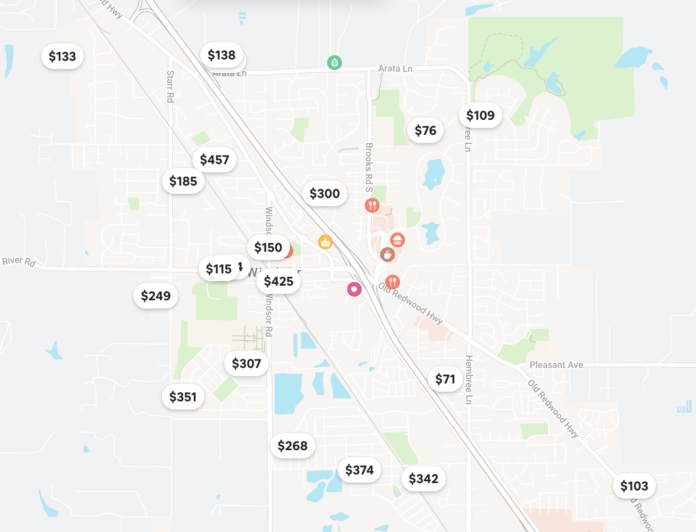
A draft ordinance that will regulate short-term rentals in Windsor came before the planning commission Jan. 11, with commissioners directing staff to revise the ordinance to reduce regulations for hosted rentals, focusing instead on non-hosted rentals, which commissioners agreed are more likely to pose immediate and long-term impacts to the community.
Short-term rentals, as defined by the draft ordinance, are residential properties or rooms therein rented for periods of fewer than 30 days, and generally refer to rental situations facilitated by online home sharing platforms like Airbnb.
There are two types of short-term rentals: hosted and non-hosted. Operators of hosted rentals live on-site and rent out individual bedrooms in their home. Because hosts are community members and are on-site, they are able to respond to any problems or complaints immediately, and the situation is also less likely to result in large parties or gatherings that can impact neighbors.
Non-hosted rentals are essentially just rented vacation homes organized through the online platform. In their discussion, commissioners said frequently that non-hosted rentals have a higher propensity to cause problems, because operators are not necessarily on site to supervise guests or respond quickly to problems, nor are they necessarily community members interested in being good neighbors, as they considered the operators of hosted rentals to be.
“It really sounds like for the hosted rentals we really don’t want regulations, we just want them to pay their taxes,” Chair Evan Zelig said. “Another reason I think it’s a really good idea to remove regulations from the hosted rentals, is then we can focus enforcement on the non-hosted people that are violating or otherwise not complying with the rules, and then staff doesn’t have to deal with hosted renters that really aren’t causing any issues.”
Direction by the town council for staff to develop an ordinance in 2017 had been delayed due to more pressing items, such as the 2017 and 2019 wildfires, the switch to district elections and the COVID-19 pandemic. According to planner Ellen McDowel with the Community Development Department, the issue was raised again recently.
“Last year, in response to recent community concerns regarding short-term rentals, the town council requested that staff proceed with preparing an ordinance,” McDowell said.
Currently, the Town of Windsor has only minimal regulations for short-term rentals, requiring by a 2015 internal policy that short-term rental operators, in order to operate in Windsor, obtain business licenses, pass a fire safety inspection and comply with Sonoma County Fire District requirements.
The staff report states that 77 business licenses have been issued since 2015, and 54 were still active in November 2021; however, staff expect through surveys of websites like Airbnb and VRBO that up to 100 short-term rentals are in operation in Windsor. The Airbnb website alone shows over 70 listings in Windsor, however, some rentals listed as being in Windsor are actually in other towns or outlying areas.
The Town of Windsor does not currently collect from short-term rentals the 12% transient occupancy tax (TOT) it collects from other transient occupancy situations, such as hotels and traditional bed and breakfasts, something the ordinance would change.
Short-term rentals are a divisive issue in some communities, although about two-thirds of the 1,200 respondents to a community development department survey released last summer think the town should allow them in Windsor. Proponents said short-term rentals fueled tourism and homeowners should have the right to generate income from their properties.
Opponents listed concerns about large gatherings, parking and “neighborhoods turning into commercial operations.”
Among commissioners, the consensus was that the draft ordinance should respect homeowners’ rights, but the town must prevent large corporations from buying up homes for this purpose.
The draft ordinance will include four zoning ordinance amendments, allowing hosted and non-hosted rentals in all residential zones in Windsor, while setting operating standards and other restrictions to prevent impacts on neighbors and the community.
Provisions would have limited new short-term rentals from operating within 300 feet of existing operators while limiting the number of days operations would be permitted to 182 — half the days of the year. Commissioners ultimately found these regulations too limiting and not useful to their goals of promoting property owners’ rights but protecting housing stock and neighborhood character, particularly regarding hosted rentals.
They also proposed removing a proposed cap limiting hosted rentals from listing more than two bedrooms, and are considering defining situations in which a host stays in an on-site accessory dwelling unit (ADU) while renting out the primary residence as hosted, rather than non-hosted as the ordinance defined.
Commissioners also agreed on the importance of avoiding overregulation, as they saw short-term rentals as an income opportunity for homeowners, and for the town through TOT. Furthermore, tax remission should not be cumbersome for operators or staff.
“Whatever we do, we have to make it easy for people to report and remit their TOTs,” said Vice Chair Ben Lehr. “That’s another reason why we wouldn’t want to limit the number of days. This is an opportunity for residents. This whole home-sharing economy is like an unpressed opportunity for wealth generation and preservation. I think it’s amazing, really. It’s also a great opportunity for the town.”
Commissioners also opposed caps on the number of short-term rentals, particularly for hosted, and recommended instead that the ordinance introduce a mechanism to limit the number of permits issued to a single operator and other permissions that would incentivize local operators over outside, corporate operators. They said limiting permits by operator would allow locals to reap the benefits of operating as an LLC, which had been prohibited by the proposed draft ordinance.
“That’s sounding like a viable way to create the circumstances that we’re looking for, which is that each homeowner has the right to use their property, and it creates a scenario where people aren’t buying up housing stock for short-term rentals instead of families moving in and creating the American Dream,” Commissioner Gina Fortino Dickson said.
City staff will return Jan. 25 with a revised draft ordinance that incorporates the commissioners’ opinions, bringing new options for outstanding problems such as preventing over concentration in any individual neighborhood, how to regulate parking and whether regulations should change in the downtown area.
By resolution, the planning commission will then recommend the Windsor Town Council consider the draft ordinance for adoption. The town council is expected to deliberate on the item in February or March.








